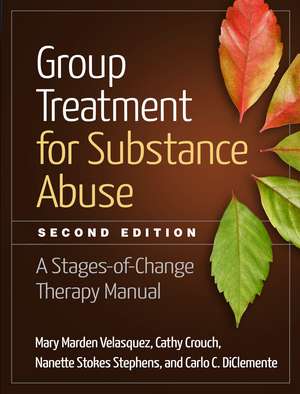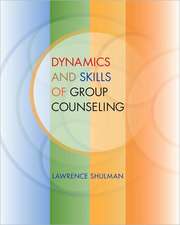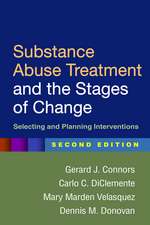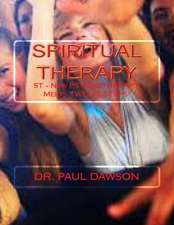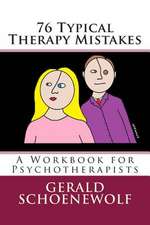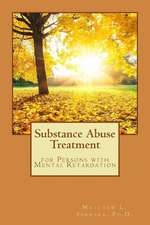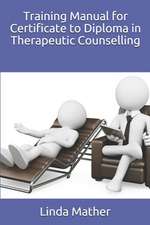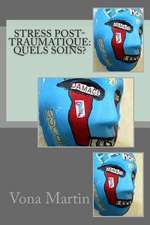Group Treatment for Substance Abuse, Second Edition: A Stages-of-Change Therapy Manual
Autor Mary Marden Velasquez, Cathy Crouch, Nanette Stokes Stephens, Carlo C. DiClementeen Limba Engleză Paperback – 4 ian 2016
The leading manual on group-based treatment of substance use disorders, this highly practical book is grounded in the transtheoretical model and emphasizes the experiential and behavioral processes of change. The program helps clients move through the stages of change by building skills for acknowledging a problem, deciding to act, developing and executing a plan, and accomplishing other critical tasks. The expert authors provide step-by-step guidelines for implementing the 35 structured sessions, along with strategies for enhancing motivation. In a large-size format for easy photocopying, the volume includes 58 reproducible handouts. Purchasers get access to a webpage where they can download and print the reproducible materials.
New to This Edition
*Reflects significant developments in research and clinical practice.
*Eight new sessions focusing on the brain and substance use, gratitude, self-control, mindfulness, acceptance, and more.
*Updated discussions of motivational interviewing and the use of cognitive-behavioral techniques with groups.
*41 of the 58 handouts are new or revised; all are now downloadable.
See also Substance Abuse Treatment and the Stages of Change, Second Edition, by Gerard J. Connors et al., which explores how the transtheoretical model can inform treatment planning and intervention in diverse clinical contexts.
New to This Edition
*Reflects significant developments in research and clinical practice.
*Eight new sessions focusing on the brain and substance use, gratitude, self-control, mindfulness, acceptance, and more.
*Updated discussions of motivational interviewing and the use of cognitive-behavioral techniques with groups.
*41 of the 58 handouts are new or revised; all are now downloadable.
See also Substance Abuse Treatment and the Stages of Change, Second Edition, by Gerard J. Connors et al., which explores how the transtheoretical model can inform treatment planning and intervention in diverse clinical contexts.
Preț: 297.90 lei
Preț vechi: 313.57 lei
-5% Nou
Puncte Express: 447
Preț estimativ în valută:
57.00€ • 59.52$ • 47.18£
57.00€ • 59.52$ • 47.18£
Carte disponibilă
Livrare economică 15-29 martie
Livrare express 01-07 martie pentru 39.01 lei
Preluare comenzi: 021 569.72.76
Specificații
ISBN-13: 9781462523405
ISBN-10: 1462523404
Pagini: 308
Dimensiuni: 203 x 267 x 20 mm
Greutate: 0.66 kg
Ediția:2 Rev ed.
Editura: Guilford Publications
Colecția Guilford Press
ISBN-10: 1462523404
Pagini: 308
Dimensiuni: 203 x 267 x 20 mm
Greutate: 0.66 kg
Ediția:2 Rev ed.
Editura: Guilford Publications
Colecția Guilford Press
Public țintă
Professional and Professional Practice & DevelopmentNotă biografică
Mary Marden Velasquez, PhD, is the Director of the Health Behavior Research and Training (HBRT) Institute at the School of Social Work, University of Texas at Austin. For more than 20 years, Dr. Velasquez has developed and studied behavioral interventions in the areas of group therapy, integrated primary care, screening and brief interventions, fetal alcohol spectrum disorder, alcohol and other drug abuse, prenatal health, sexually transmitted disease and HIV prevention, and smoking cessation. With particular expertise in the use of evidence-based brief interventions in health care, substance abuse treatment, and criminal justice settings, she is the author of numerous publications on motivational interventions in high-risk settings. She is a member of the Motivational Interviewing Network of Trainers (MINT).
Cathy Crouch, LCSW, is Executive Vice-President of SEARCH Homeless Services, a large multi-service organization in Houston, Texas, which works with persons who have substance use problems and other issues. She has 27 years of management experience in nonprofit, corporate, and academic settings, and a strong commitment to using evidence-based practices and conducting research and evaluation. Over her career she has served as coprincipal investigator or consultant on a number of large federally funded research grants, including several clinical trials. Ms. Crouch is a licensed clinical social worker, a state board-approved clinical supervisor, and a member of MINT.
Nanette Stokes Stephens, PhD, is Director of Training and Research Scientist at the HBRT Institute at the University of Texas at Austin. Dr. Stephens has more than 20 years of experience working with the transtheoretical model and utilizing motivational interviewing as a trainer, clinician, consultant, coach, and supervisor, and she has published peer-reviewed journal articles and book chapters. She is a member of MINT and has worked in a wide range of settings and agencies, including those that provide substance abuse services for veterans, homeless people, military personnel, juvenile probationers, college students, and women at risk for alcohol- and tobacco-exposed pregnancies.
Carlo C. DiClemente, PhD, ABPP, is Professor Emeritus of Psychology at the University of Maryland, Baltimore County (UMBC), and Director of the MDQuit tobacco resource center, the Center for Community Collaboration, and the Home Visitor Training Certificate Program at UMBC. He is codeveloper of the transtheoretical model of behavior change and author of numerous scientific publications on motivation and behavior change with a variety of health and addictive behaviors. His books include Addiction and Change, Second Edition; Substance Abuse Treatment and the Stages of Change, Second Edition; Group Treatment for Substance Abuse, Second Edition; and the self-help resource Changing for Good. Dr. DiClemente is a recipient of awards including the Lifetime Achievement Award from the Addictive Behaviors Special Interest Group of the Association for Behavioral and Cognitive Therapies, the John P. McGovern Award from the American Society of Addiction Medicine, the Innovators Combating Substance Abuse award from the Robert Wood Johnson Foundation, and a Presidential Citation from the American Psychological Association.
Cathy Crouch, LCSW, is Executive Vice-President of SEARCH Homeless Services, a large multi-service organization in Houston, Texas, which works with persons who have substance use problems and other issues. She has 27 years of management experience in nonprofit, corporate, and academic settings, and a strong commitment to using evidence-based practices and conducting research and evaluation. Over her career she has served as coprincipal investigator or consultant on a number of large federally funded research grants, including several clinical trials. Ms. Crouch is a licensed clinical social worker, a state board-approved clinical supervisor, and a member of MINT.
Nanette Stokes Stephens, PhD, is Director of Training and Research Scientist at the HBRT Institute at the University of Texas at Austin. Dr. Stephens has more than 20 years of experience working with the transtheoretical model and utilizing motivational interviewing as a trainer, clinician, consultant, coach, and supervisor, and she has published peer-reviewed journal articles and book chapters. She is a member of MINT and has worked in a wide range of settings and agencies, including those that provide substance abuse services for veterans, homeless people, military personnel, juvenile probationers, college students, and women at risk for alcohol- and tobacco-exposed pregnancies.
Carlo C. DiClemente, PhD, ABPP, is Professor Emeritus of Psychology at the University of Maryland, Baltimore County (UMBC), and Director of the MDQuit tobacco resource center, the Center for Community Collaboration, and the Home Visitor Training Certificate Program at UMBC. He is codeveloper of the transtheoretical model of behavior change and author of numerous scientific publications on motivation and behavior change with a variety of health and addictive behaviors. His books include Addiction and Change, Second Edition; Substance Abuse Treatment and the Stages of Change, Second Edition; Group Treatment for Substance Abuse, Second Edition; and the self-help resource Changing for Good. Dr. DiClemente is a recipient of awards including the Lifetime Achievement Award from the Addictive Behaviors Special Interest Group of the Association for Behavioral and Cognitive Therapies, the John P. McGovern Award from the American Society of Addiction Medicine, the Innovators Combating Substance Abuse award from the Robert Wood Johnson Foundation, and a Presidential Citation from the American Psychological Association.
Cuprins
Introduction
I. How to Help People Change
1. How People Change: The Transtheoretical Model
2. Strategies for Facilitating Change
3. Putting It All Together: Setting Up and Carrying Out the Intervention
II. Thinking about Changing Substance Use
P/C/P Sequence: Precontemplation–Contemplation–Preparation
P/C/P Session 1: The Stages of Change
Change Process Objective: Consciousness Raising
P/C/P Session 2: Myths and Misconceptions
Change Process Objectives: Consciousness Raising, Self-Reevaluation
P/C/P Session 3: Alcohol’s Effects on the Body
Change Process Objectives: Consciousness Raising, Self-Reevaluation
P/C/P Session 4: Drugs’ Effects on the Body
Change Process Objectives: Consciousness Raising, Self-Reevaluation
P/C/P Session 5: The Brain and Substance Use
Change Process Objective: Consciousness Raising
P/C/P Session 6: Expectations
Change Process Objectives: Consciousness Raising, Self-Reevaluation
P/C/P Session 7: Personal Values
Change Process Objectives: Self-Reevaluation, Emotional Arousal
P/C/P Session 8: Expressions of Concern
Change Process Objectives: Self-Reevaluation, Environmental Reevaluation, Emotional Arousal
P/C/P Session 9: Relationships
Change Process Objective: Environmental Reevaluation
P/C/P Session 10: Tipping the Balance of Change
Change Process Objectives: Decisional Balance, Self-Reevaluation, Environmental Reevaluation
P/C/P Session 11: Gratitude
Change Process Objective: Emotional Arousal
P/C/P Session 12: Roles
Change Process Objective: Environmental Reevaluation
P/C/P Session 13: Self-Control
Change Process Objective: Self-Liberation
P/C/P Session 14: Temptation and Confidence
Change Process Objectives: Self-Efficacy, Self-Reevaluation, Environmental Reevaluation
P/C/P Session 15: Problem Solving
Change Process Objectives: Self-Efficacy, Social Liberation
P/C/P Session 16: Preparing for Change
Change Process Objective: Self-Liberation
P/C/P Session 17: Review and Termination
Change Process Objectives: Self-Reevaluation, Self-Efficacy
III. Making Changes in Substance Use
A/M Sequence: Action–Maintenance
A/M Session 1: The Stages of Change
Change Process Objective: Consciousness Raising
A/M Session 2: High-Risk Situations
Change Process Objective: Stimulus Control
A/M Session 3: Mindfulness
Change Process Objective: Counterconditioning
A/M Session 4: Disrupting Habits
Change Process Objectives: Stimulus Control, Counterconditioning
A/M Session 5: Managing Cravings and Urges
Change Process Objectives: Stimulus Control, Counterconditioning, Reinforcement Management
A/M Session 6: Acceptance
Change Process Objective: Counterconditioning
A/M Session 7: Rewarding My Successes
Change Process Objective: Reinforcement Management
A/M Session 8: Assertive Communication
Change Process Objectives: Counterconditioning, Reinforcement Management
A/M Session 9: Effective Refusals
Change Process Objectives: Counterconditioning, Reinforcement Management
A/M Session 10: Managing Criticism
Change Process Objectives: Counterconditioning, Reinforcement Management
A/M Session 11: Positive Thinking
Change Process Objectives: Stimulus Control, Counterconditioning, Reinforcement Management
A/M Session 12: Managing Anxiety
Change Process Objectives: Stimulus Control, Counterconditioning
A/M Session 13: Wellness
Change Process Objectives: Stimulus Control, Counterconditioning, Reinforcement Management
A/M Session 14: Moving Forward
Change Process Objective: Self-Liberation
A/M Session 15: Recommitting after a Slip
Change Process Objective: Self-Liberation
A/M Session 16: Social Support
Change Process Objective: Helping Relationships
A/M Session 17: Building Your Future
Change Process Objective: Social Liberation
A/M Session 18: Review and Termination
Change Process Objectives: Self-Efficacy, Reinforcement Management
Appendix. Professional Contacts and Suggested Resources
References
Index
I. How to Help People Change
1. How People Change: The Transtheoretical Model
2. Strategies for Facilitating Change
3. Putting It All Together: Setting Up and Carrying Out the Intervention
II. Thinking about Changing Substance Use
P/C/P Sequence: Precontemplation–Contemplation–Preparation
P/C/P Session 1: The Stages of Change
Change Process Objective: Consciousness Raising
P/C/P Session 2: Myths and Misconceptions
Change Process Objectives: Consciousness Raising, Self-Reevaluation
P/C/P Session 3: Alcohol’s Effects on the Body
Change Process Objectives: Consciousness Raising, Self-Reevaluation
P/C/P Session 4: Drugs’ Effects on the Body
Change Process Objectives: Consciousness Raising, Self-Reevaluation
P/C/P Session 5: The Brain and Substance Use
Change Process Objective: Consciousness Raising
P/C/P Session 6: Expectations
Change Process Objectives: Consciousness Raising, Self-Reevaluation
P/C/P Session 7: Personal Values
Change Process Objectives: Self-Reevaluation, Emotional Arousal
P/C/P Session 8: Expressions of Concern
Change Process Objectives: Self-Reevaluation, Environmental Reevaluation, Emotional Arousal
P/C/P Session 9: Relationships
Change Process Objective: Environmental Reevaluation
P/C/P Session 10: Tipping the Balance of Change
Change Process Objectives: Decisional Balance, Self-Reevaluation, Environmental Reevaluation
P/C/P Session 11: Gratitude
Change Process Objective: Emotional Arousal
P/C/P Session 12: Roles
Change Process Objective: Environmental Reevaluation
P/C/P Session 13: Self-Control
Change Process Objective: Self-Liberation
P/C/P Session 14: Temptation and Confidence
Change Process Objectives: Self-Efficacy, Self-Reevaluation, Environmental Reevaluation
P/C/P Session 15: Problem Solving
Change Process Objectives: Self-Efficacy, Social Liberation
P/C/P Session 16: Preparing for Change
Change Process Objective: Self-Liberation
P/C/P Session 17: Review and Termination
Change Process Objectives: Self-Reevaluation, Self-Efficacy
III. Making Changes in Substance Use
A/M Sequence: Action–Maintenance
A/M Session 1: The Stages of Change
Change Process Objective: Consciousness Raising
A/M Session 2: High-Risk Situations
Change Process Objective: Stimulus Control
A/M Session 3: Mindfulness
Change Process Objective: Counterconditioning
A/M Session 4: Disrupting Habits
Change Process Objectives: Stimulus Control, Counterconditioning
A/M Session 5: Managing Cravings and Urges
Change Process Objectives: Stimulus Control, Counterconditioning, Reinforcement Management
A/M Session 6: Acceptance
Change Process Objective: Counterconditioning
A/M Session 7: Rewarding My Successes
Change Process Objective: Reinforcement Management
A/M Session 8: Assertive Communication
Change Process Objectives: Counterconditioning, Reinforcement Management
A/M Session 9: Effective Refusals
Change Process Objectives: Counterconditioning, Reinforcement Management
A/M Session 10: Managing Criticism
Change Process Objectives: Counterconditioning, Reinforcement Management
A/M Session 11: Positive Thinking
Change Process Objectives: Stimulus Control, Counterconditioning, Reinforcement Management
A/M Session 12: Managing Anxiety
Change Process Objectives: Stimulus Control, Counterconditioning
A/M Session 13: Wellness
Change Process Objectives: Stimulus Control, Counterconditioning, Reinforcement Management
A/M Session 14: Moving Forward
Change Process Objective: Self-Liberation
A/M Session 15: Recommitting after a Slip
Change Process Objective: Self-Liberation
A/M Session 16: Social Support
Change Process Objective: Helping Relationships
A/M Session 17: Building Your Future
Change Process Objective: Social Liberation
A/M Session 18: Review and Termination
Change Process Objectives: Self-Efficacy, Reinforcement Management
Appendix. Professional Contacts and Suggested Resources
References
Index
Recenzii
"There is a dizzying array of seemingly correct methods for helping people change, so what is a busy practitioner to do? Velasquez and her colleagues have supplied the answer: do the right thing at the right time. This book provides an orientation to the transtheoretical model from one of its originators and outlines group treatment sessions developed by savvy clinicians. The second edition retains the best-loved features of the first edition while adding new developments from motivational interviewing, cognitive-behavioral therapy, and positive psychology. Each session includes the processes engaged, the tasks to be accomplished, and the markers that help us know if clients are making progress--plus, most important, the step-by-step instructions to get the work done."--David B. Rosengren, PhD, President and CEO, Prevention Research Institute, Lexington, Kentucky
"I love this book. The second edition distills the best strategies from motivational interviewing, cognitive-behavioral therapy, and other approaches. It’s exactly what I need: practical strategies, tips, and handouts that make it easy to conduct groups. The progression of session topics--from precontemplation, to contemplation, to action--works really well. I love the inclusion of new activities related to mindfulness, acceptance, and wellness. Hands down, my favorite book for running clinical groups!"--Scott T. Walters, PhD, Regents Professor, School of Public Health, University of North Texas Health Science Center
"This reader-friendly second edition contains useful, sensible instructions for flexibly facilitating group treatment for people with substance use disorders--I can't say enough good things about it! It is well organized by sessions, and provides excellent clinical resource materials. This book can be used by practitioners in clinical settings; faculty who teach courses in group therapy, addictive behaviors, or evidence-based practice; and researchers who conduct clinical trials. A great resource for psychology students, it brings to life important concepts such as 'readiness to change,' while showing how to apply them in an empirically supported treatment."--Bruce S. Liese, PhD, ABPP, Professor of Family Medicine and Psychiatry, and Clinical Director, Cofrin Logan Center for Addiction Research and Treatment, University of Kansas
"This second edition contains the latest research on the stages and processes of change, motivational interviewing, self-control, positive psychology, and mindfulness in relapse prevention, and applies this content in new group sessions. Included are objectives, step-by-step directions, tasks, and handouts that can be used by veteran and new group facilitators alike. Addiction studies, counseling, and social work students will find this text immensely useful for coursework and field internships."--Melinda Hohman, PhD, MSW, School of Social Work, San Diego State University
"This second edition shows that even the best, most useful books can be improved. The manual is full of current scientific information, presented in digestible nuggets that inform group leaders about the 'why' and 'how' of effective, theory-based treatment for substance users. The first chapter presents one of the most concise and accessible available overviews of the transtheoretical model, and should be required reading for graduate courses on health behavior change. The rest of the book is equally impressive, with a number of completely new session outlines and handouts. While the content is immediately usable for beginning group leaders, there are enough sophisticated, evidence-based ideas throughout the manual to help even experienced group leaders maximize their productiveness."--Karen S. Ingersoll, PhD, Department of Psychiatry and Neurobehavioral Sciences, University of Virginia
-Velasquez and colleagues have produced a book that is accessible and practical for clinicians. The intervention approaches in the therapy manual are well supported with accepted theoretical underpinnings….This manual is structured in such a way that it will be useful to both the novice and the experienced group work clinician and even offers a brief refresher on group work….This text would make a useful and user-friendly addition to the library of any clinician working with people who are undertaking to change their substance-related behavior, particularly in a group work center.--Drug and Alcohol Review, 3/1/2017ƒƒI would highly recommend this book to substance abuse counselors of all levels, from beginners to experienced counselors. It provides an understandable way to use the stages of change, which underlies most of the evidence-based practices at the time in the treatment field. (on the first edition)--Journal of Groups in Addiction and Recovery, 4/2/2015"I love this book. The second edition distills the best strategies from motivational interviewing, cognitive-behavioral therapy, and other approaches. It’s exactly what I need: practical strategies, tips, and handouts that make it easy to conduct groups. The progression of session topics--from precontemplation, to contemplation, to action--works really well. I love the inclusion of new activities related to mindfulness, acceptance, and wellness. Hands down, my favorite book for running clinical groups!"--Scott T. Walters, PhD, Regents Professor, School of Public Health, University of North Texas Health Science Center
"This reader-friendly second edition contains useful, sensible instructions for flexibly facilitating group treatment for people with substance use disorders--I can't say enough good things about it! It is well organized by sessions, and provides excellent clinical resource materials. This book can be used by practitioners in clinical settings; faculty who teach courses in group therapy, addictive behaviors, or evidence-based practice; and researchers who conduct clinical trials. A great resource for psychology students, it brings to life important concepts such as 'readiness to change,' while showing how to apply them in an empirically supported treatment."--Bruce S. Liese, PhD, ABPP, Professor of Family Medicine and Psychiatry, and Clinical Director, Cofrin Logan Center for Addiction Research and Treatment, University of Kansas
"This second edition contains the latest research on the stages and processes of change, motivational interviewing, self-control, positive psychology, and mindfulness in relapse prevention, and applies this content in new group sessions. Included are objectives, step-by-step directions, tasks, and handouts that can be used by veteran and new group facilitators alike. Addiction studies, counseling, and social work students will find this text immensely useful for coursework and field internships."--Melinda Hohman, PhD, MSW, School of Social Work, San Diego State University
"This second edition shows that even the best, most useful books can be improved. The manual is full of current scientific information, presented in digestible nuggets that inform group leaders about the 'why' and 'how' of effective, theory-based treatment for substance users. The first chapter presents one of the most concise and accessible available overviews of the transtheoretical model, and should be required reading for graduate courses on health behavior change. The rest of the book is equally impressive, with a number of completely new session outlines and handouts. While the content is immediately usable for beginning group leaders, there are enough sophisticated, evidence-based ideas throughout the manual to help even experienced group leaders maximize their productiveness."--Karen S. Ingersoll, PhD, Department of Psychiatry and Neurobehavioral Sciences, University of Virginia
Descriere
The leading manual on group-based treatment of substance use disorders, this highly practical book is grounded in the transtheoretical model and emphasizes the experiential and behavioral processes of change. The program helps clients move through the stages of change by building skills for acknowledging a problem, deciding to act, developing and executing a plan, and accomplishing other critical tasks.
